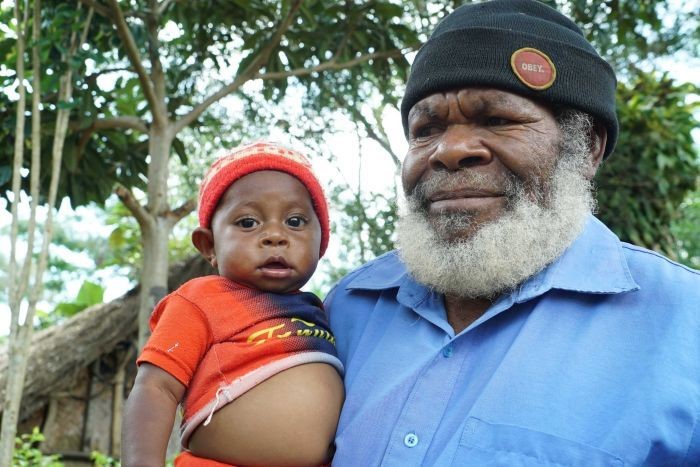Papua New Guinea has 240,000 babies born each year and 6,000 die before completing the first month of life due to prematurity and low birth weight. The government and partners, including UNICEF and WHO, are supporting scale-up of evidence based interventions of Early Essential Newborn Care and Kangaroo Care. While kangaroo care is initiated at the health facility where baby is born, parents are advised to provide continued skin-to-skin contact at home with exclusive breastfeeding. Mothers in PNG usually have many children and have a heavy workload of subsistence farming and cooking, resulting in them frequently leaving their children unattended. But now, as part of Early Essential Newborn Care (EENC) programme, fathers are learning about importance of essential newborn care, particularly about skin-to-skin contact, early breast feeding, the dangers of their babies getting cold, and how to take care of their babies.
Dads are now stepping in to warm the babies when the mother is out, something previously unheard of in Papua New Guinea, where caring for children is considered to be women’s work.

Fathers in PNG are embracing skin-to-skin contact to help their low birth weight/premature babies, who are more likely to suffer from hypothermia.
“My baby is a gift from God,” says Ikia Thomas, the father of the twin babies. His babies were born three months early in Port Moresby General hospital, Papua New Guinea, with no incubator to protect her tiny newborns from hypothermia. But UNICEF is helping with a simple alternative – skin-to-skin contact and a blanket wrap to help to stabilize his baby’s temperature, encourage breastfeeding and start a lasting relationship with father and mother. “I’m not worried about the future,” says the young father. “I’m happy that my child is growing well and gaining weight. We (me and my wife) are doing skin-to-skin every day 6 to 8 times daily. We are a happy family, me and my wife, because of this child. I started skin-to-skin care to my baby with a lot of hesitancy. I was not confident enough to hold my tiny babies. But nurses encouraged me and showed some videos where fathers are doing skin-to-skin to very tiny babies. I got the confidence and initially I did for one or two times daily. But gradually I started liking my baby’s touches. I developed very good bonding with my babies. Now-a-days, I run back to home from my work to hold my babies.”
“I am happy that God has listen to our prayer and given us twin babies,” who were born two and half months early in Goroka Provincial Hospital, Papua New Guinea. He was shown how to do skin-to-skin care by the nurses at the hospital and instructed to do as much and as many times as possible. The nursing staff told him that “the first thirty days matters a lot in his baby’s life. I am doing skin-to-skin contact along with my wife daily…I learnt that I have the power to build my babies brain. I am very happy and connected to my baby. I feel his heartbeats.”


Another father-of-eight, Samuel Anton, said his new baby is the first that he has actively held against his chest to warm when it is cold.
“When the mother has other work to do, like cooking food, the father can look after the baby,” he said.
“It is my responsibility.”
“Now he is more than a year old and smarter than other children I have. Better growth. Breastfeeds more than other babies. Smiles a lot. Better bonding.”
“All of my family members understand skin-to-skin contact very well. My baby is growing well in comparison to other 7 children of mine. Not sick during the first month of life. I am happy.”
Photo: Father-of-two days old twins, Michale said he is sharing the responsibilities of caring babies and doing KMC for his twin babies. (ABC News: Eric Tlozek)
